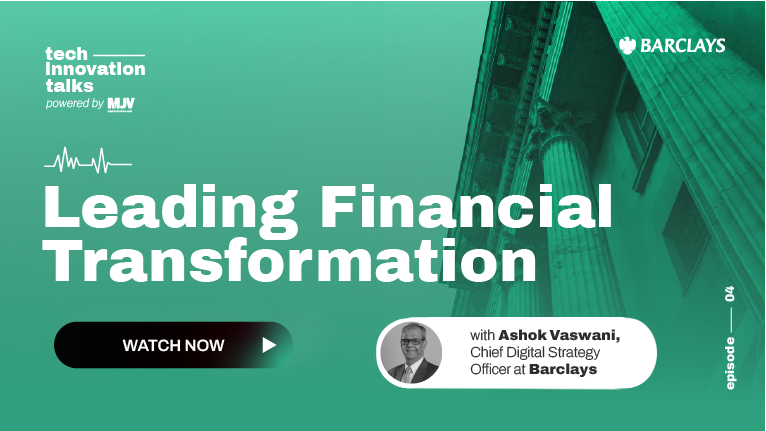Barclays’ CDSO on ESG: “We are spending a lot of time and effort to move the agenda”
In this episode of Tech Innovation Talks we sit down with Ashok Vaswani, Barclays’ Chief Digital Strategy Officer, and Mauricio Vianna, MJV’s CEO, to talk about leading financial transformation.
Traditional financial institutions like Barclays have been around for a very long time. As a result, a lot of these long-standing companies have relied on analog processes that run on outdated technology. But this is no longer the case.
Ashok has been in charge of updating and digitizing Barclays to keep up with the times, and it’s clear that they are well ahead of the curve when it comes to new technologies and trends. The insights he brings us in this video podcast are not only relevant to finance companies but businesses as a whole.
The first of which, rather unsurprisingly, has to do with the effects of the COVID-19 pandemic. Ashok stated that the pandemic “has really made every single company a financial services company to some extent”.
The justification behind this statement is that with the inflection of digital and the prominence of e-marketplaces, companies will at the very least be involved in payments, with credit not far off.
Open APIs at the core of financial system
As companies start incorporating financial services into their services, institutions like Barclays can begin to take advantage of company interconnectivity to insert themselves across several industries. And the only way to communicate effectively with these other businesses in the digital realm is through APIs. As Ashok notes:
“If you again say that you’re going to participate in various ecosystems with various companies, the only way to connect seamlessly with all these companies is via API.”
Opening up APIs is nothing new for the financial sector, and banks have been sharing customer information with one another through APIs for some time now. The big leap here though is that these institutions are beginning to open up their APIs to every retailer, fintech, and even individuals so that they can take advantage of and draw on the institution’s financial capabilities.
As our CEO Mauricio states, “It’s an excellent way to organize the communication across different applications inside different organizations”, adding that APIs are the only secure way to share information openly between organizations.
The importance of security in an open digital world cannot be overstated. This is especially true for financial industries that deal with sensitive data, including their clients’ private information.
Positive-impact to Transform: the ESG agenda
The digital world has done a lot more in the past few decades than simply making it easier for companies to communicate with one another. A big trend in the financial services market is the inclusion of vulnerable groups into the banking fold. Ashok assured:
“We (Barclays) take it extremely seriously, and are spending a lot of time and effort identifiying opportunities that we think can help move the agenda”.
Every year, more and more companies are looking to ESG values to help guide corporate strategy. This is one of the many trends that have been growing alongside the digital boom.
Environmental and Social issues are finally becoming a top priority for large institutions all over the world, and Barclays is no exception.
At first glance, this might just seem like a branding/marketing trend, but customers are beginning to take these positive-impact actions under consideration during their customer journey. This makes the move towards greener operations a strategically sound investment for companies.
We don’t want to give too much of this Tech Innovation Talks away here, so if you want the whole story, we highly recommend that you take a moment to watch the full interview here. It’s a rare opportunity to get leaders in any industry to take us through some of the strategies and trends that are at the forefront of their individual markets.
For more cutting-edge innovation content, check out our YouTube channel. You can also find us on Spotify, Apple, and Google podcasts.

